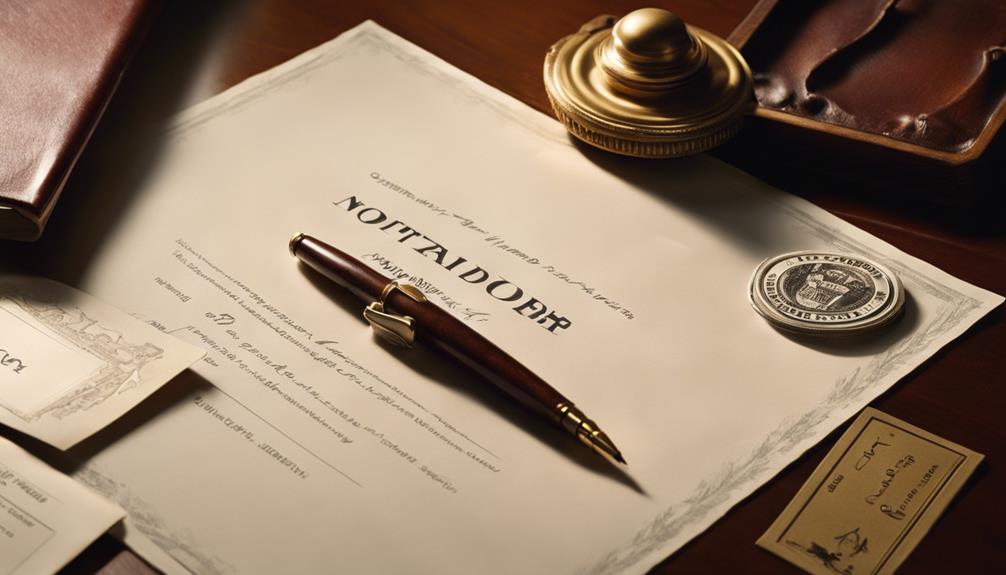When you think about becoming a notary public in Washington State, understanding the notary bond is essential. It's not just a formality; it's a safeguard for you and your clients against mistakes. You might assume it's straightforward, but there are nuances in the requirements and renewal process that can catch you off guard. Plus, misconceptions often cloud the true purpose of this bond. So, what are the key aspects that every aspiring notary should know to navigate these complexities effectively?
What Is a Notary Bond?

A notary bond is a crucial component of a notary's professional responsibilities, ensuring that you, as a notary public, act ethically and within the law.
Essentially, it's a type of insurance policy that protects the public from potential mistakes or misconduct you might commit while performing notarial acts.
When you become a notary, you're required to obtain a bond, which involves a financial commitment. This bond typically involves a predetermined amount that can vary by state.
If a client suffers a loss due to your improper actions—like fraud or negligence—they can file a claim against your bond. This means that the bond company may compensate the affected party, and you'll be responsible for reimbursing the bond company.
Notary bonds serve to maintain trust in the notarial process, reassuring the public that you're financially accountable for your actions.
It's crucial to understand that obtaining a bond doesn't just fulfill a requirement; it's an affirmation of your dedication to integrity.
Importance of a Notary Bond
Understanding the importance of a notary bond can make a significant difference in your career as a notary public. A notary bond acts as a safety net, protecting your clients and ensuring that you adhere to ethical standards. When you're bonded, it shows your commitment to acting responsibly and professionally, which builds trust with clients and the community.
Without a bond, you risk liability for any mistakes or misconduct that may occur during your notarizations. If a client suffers damages due to your negligence, they could seek compensation from you directly. However, with a notary bond, you have coverage that can help mitigate financial losses, making you a more appealing choice to potential clients.
Furthermore, many states require notaries to obtain a bond as part of the licensing process. This means that having a bond isn't just beneficial; it's often a legal necessity for your practice.
Requirements for Obtaining a Bond

Before you can start your journey as a notary public, you'll need to meet specific requirements to obtain a notary bond. First, you must be at least 18 years old and a resident of Washington State. If you've been convicted of a felony or a crime involving moral turpitude, you may face restrictions, so check your eligibility.
Next, you'll need to complete a notary education course approved by the state. This course will help you understand your duties and the ethical standards expected of you. After finishing the course, you'll receive a certificate that you'll need when you apply for the bond.
Once you've got your education certificate, it's time to secure a surety bond. The bond amount in Washington is typically $10,000, and you'll want to shop around to find a provider that fits your needs and budget.
Be prepared to pay a premium for the bond, which varies based on your credit history and the surety company.
How to Renew Your Bond
Renewing your notary bond is a straightforward process that ensures you remain compliant with state regulations.
To start, check the expiration date of your current bond. It's crucial to renew it before it lapses to avoid any legal issues. Typically, you'll want to initiate the renewal process at least a month in advance.
Next, contact your surety bond provider. They'll guide you through the specific requirements for renewal. You'll likely need to fill out a renewal application and pay a renewal fee. This fee may vary depending on the bond amount and your provider.
Once you've submitted the necessary documents and payment, your provider will review your application. If everything checks out, you'll receive your renewed notary bond.
Keep a copy of the new bond for your records and submit it to your state's notary commissioning authority if required.
Common Misconceptions About Notary Bonds

Notary bonds often spark confusion among new notaries and those unfamiliar with the notary process. One common misconception is that a notary bond protects the notary themselves. In reality, the bond is designed to protect the public from any misconduct or errors you might make while performing your duties. If a claim is made against you, the bond assures that the affected party can recover damages.
Another myth is that all notaries need a bond, but requirements vary by state. While many states do require a bond, others might not, so it's essential to check your local regulations.
Some people also believe that a notary bond is the same as insurance, but that's not true. A bond is a guarantee of your integrity, whereas insurance protects you from financial losses.
Lastly, many think that once you obtain a bond, you're set for life. In fact, bonds typically expire after a certain period, and you'll need to renew them regularly to maintain compliance.
Understanding these misconceptions can help you navigate the notary landscape more effectively and protect yourself and the public you serve.
Conclusion
In conclusion, understanding your notary bond is essential for your role as a notary public in Washington State. It not only protects the public but also reinforces your commitment to ethical conduct. Remember to keep up with the renewal process to maintain your license and avoid any misconceptions about the bond's purpose. By staying informed and responsible, you'll strengthen public trust and ensure a successful notary practice.

